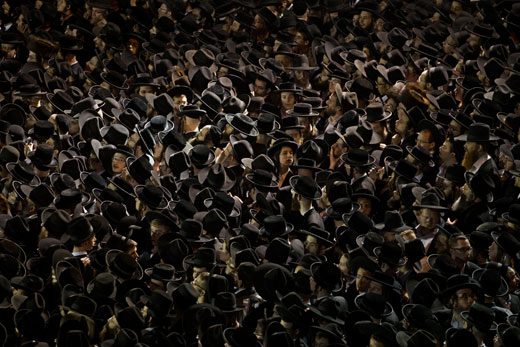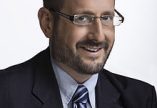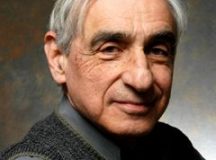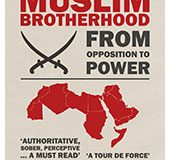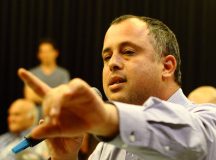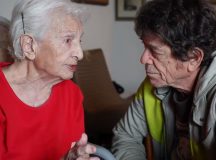The growing size of the ultra-Orthodox (Haredi) population, and its self-imposed isolation from the worlds of military service and work is the subject of an urgent debate at all levels of Israeli society. Rabbi Dov Lipman, an MK and a ‘modern Haredi’ suggests a paradox: the ultra-Orthodox should address their future by recovering their past.
Ultra-Orthodox Jews have lived in the geographic borders of the current State of Israel for thousands of years, while large numbers returned from 2000 years of exile at the turn of the 19th century. They lived very spiritual lives, focused exclusively on Biblical and Talmudic study in holy cities such as Safed and Jerusalem. They were supported by Jewish communities in Europe as the spiritual representatives in the holy land for Jews throughout the world.
Secular Zionism, a movement which arrived on the scene in the late 19th century, was viewed as the ultimate threat by this community. The response of the ultra-Orthodox to the non-religious Jews who flocked to Palestine in the late 19th century and beginning of the 20th century was to circle their wagons. The ultra-Orthodox community viewed the developing Jewish state in Palestine as a threat to its existence and refused to be involved – not in army service, not in the work force, and certainly not in any level of general education. The ideology of not going to work to sustain the family was foreign to Jewish tradition but introduced as a response to the devastating impact of the Holocaust on institutions of Talmudic scholarship and on the scholars themselves. This approach was concretised in an arrangement between Israel’s first Prime Minister David Ben-Gurion and the ultra-Orthodox rabbinic leadership, granting an official exemption from military service to those whose Talmudic study was categorised as their ‘occupation.’
This arrangement originally applied to 400 young men. Today, to 60,000. The 400 could focus on spirituality and the rest of the country could support them. Today, 60,000 young men receive no general education, don’t serve in the military, and don’t join the work force, while those within the ultra-Orthodox community who want to do so must find the courage to go against the community’s ideology and be treated as second class citizens.
In an interesting twist, in order to enable the young men to focus on their religious studies, many ultra-Orthodox women, who traditionally have been the homemakers in this community, do receive a general education and do join the work force. Many women view it as a source of pride that they are both homemaker and professional in order to enable the husband to study.
While this development among ultra-Orthodox women is certainly a great step forward to integrate the community with broader Israel, the situation regarding the men damages Israel on a variety of levels.
First and foremost, this arrangement can no longer work economically. A community which has grown to one-tenth of the Israeli population and will become a much larger percentage of the population in the near future, with an average of eight to ten children being born per family, simply cannot be supported by the rest of the country; to encourage non-tax payers in such large and growing numbers is a recipe for fiscal collapse.
Second, the resentment of those in work about supporting those who choose not to work has created deep polarisation in Israeli society.
And, finally, because these scholars represent religion, their isolation from society pushes Israelis further and further away from any connection to their Judaism.
The current system is also negative for the ultra-Orthodox. For most young men, a system which forces them to do nothing other than study religion can actually create a spiritual crisis. There are estimates that close to 20 per cent leave ultra-Orthodoxy as a result of the extreme demands placed on them. And when they leave ultra-Orthodoxy many if not most cannot find the delicate balance between religion and being part of society and end up leaving the religious life all together. And that for me, as someone who is ultra-Orthodox, is unacceptable.
My dream is that the ultra-Orthodox population in Israel will serve as doctors, lawyers, accountants, hi-tech entrepreneurs, and Generals in the Israeli Defense Forces. They will remain fervently Orthodox and Talmudic scholars while contributing to society, and in the process save Israel economically, socially, and spiritually.
I grew up in the United States of America where the ultra-Orthodox did not experience the spiritual world of their counterparts in late 18th and 19th century Palestine. They had to work to earn a living and so they found a way to build institutions which taught Biblical and Talmudic texts on the highest of levels while also teaching general studies and preparing the young men for entry into the work force. I know firsthand from my years studying in one of those institutions while also attending graduate school that one can become a tremendous religious scholar while studying Maths, English, and Science and working to support a family.
Interestingly enough, Jewish tradition is replete with sources which teach the importance of earning a living; the Talmud says parents are obligated to teach their children a trade and that studying religious texts without earning a living leads to sin! Throughout our history our greatest rabbis achieved the highest of levels in professional careers.
My dream is not to create a revolution but to restore that glorious tradition. A return to this traditional Jewish approach will benefit Israel in many ways: economic strength, social unity, and an increase in spirituality. Israel has its fair share of crime and of children and youth who are far too self-centered and not part of a culture of giving. The ultra-Orthodox community is known for its focus on giving and for living a values-centered life which also finds expression in its very low crime rate. Ultra-Orthodox professionals could spread these positive values throughout the country.
The good news about my dream is that the younger population in the ultra-Orthodox community is ready for this change. They don’t want to be impoverished and want to contribute. They want to remain fervently Orthodox while enjoying other pursuits and supporting their families with dignity.
The facts have already begun to change on the ground. This year, seven ultra-Orthodox high schools have joined a newly formed public school system in which basic general studies will be added to the high level Talmud curriculum already in place. Post-high school religious seminaries which combine religious studies with vocational training and options for military service are in formation.
I think my dream is achievable. Once young ultra-Orthodox men understand that military service, higher education and professional careers do not demand that they forsake their religious beliefs and practices, they will pursue all these opportunities. The result will be an economically stronger Israel, a more value-centered Israel, and a more unified Israel.

